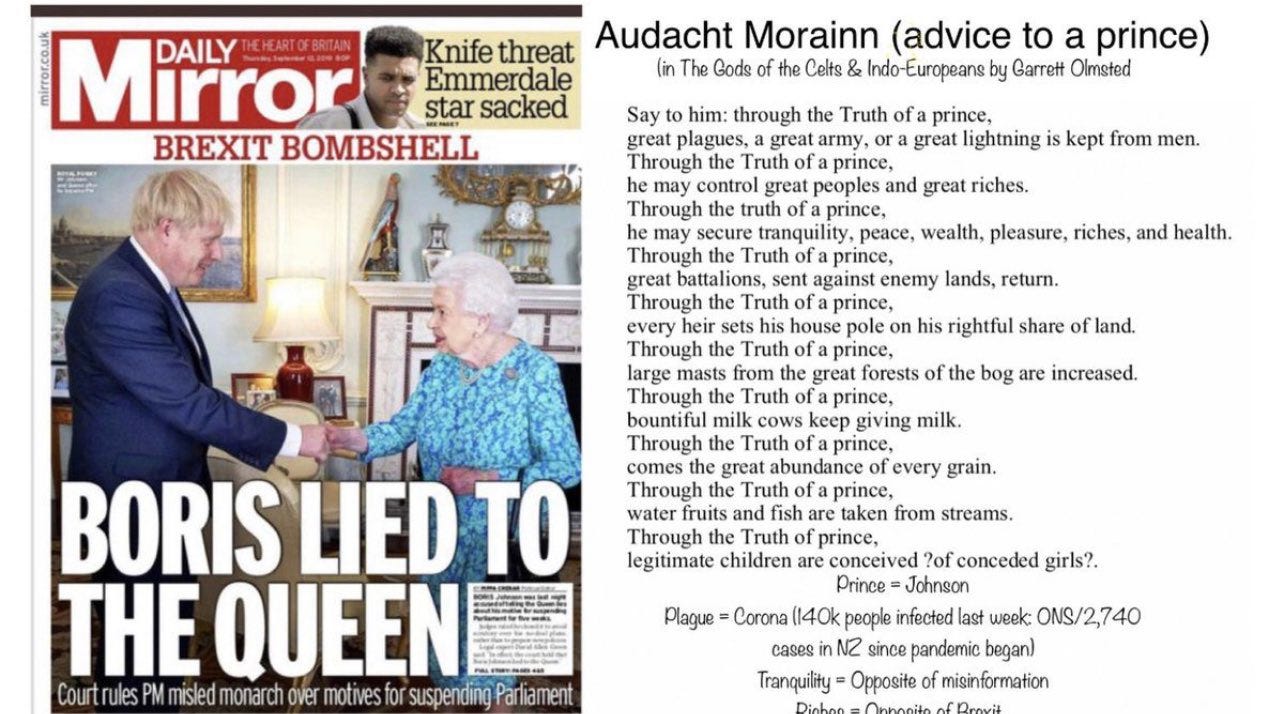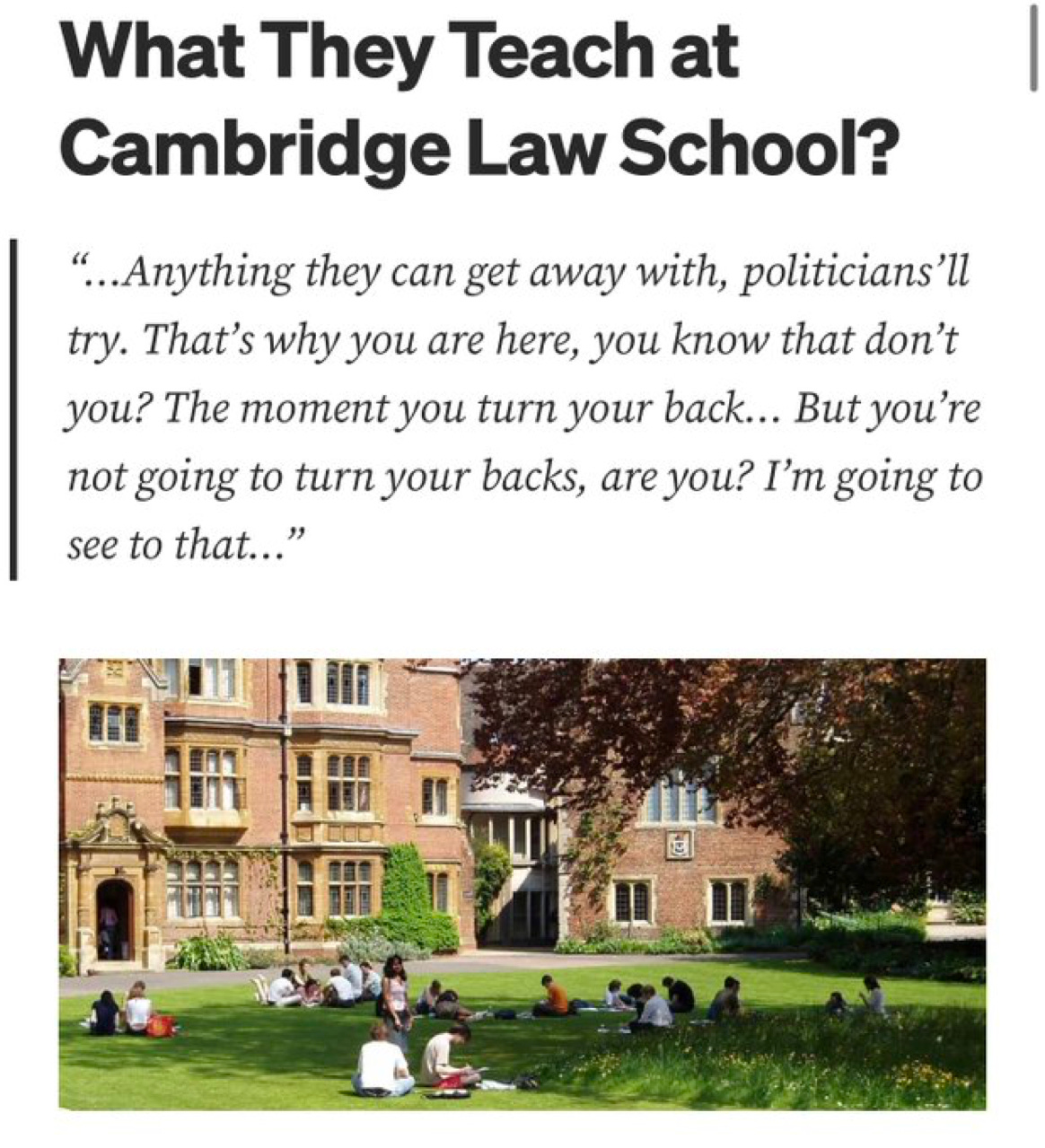⚡️Problem With English "Parliamentary Sovereignty"?
Parliament may be "supreme", but it's not "sovereign." Here's why this matters:
It's a myth. Note the word "commonly" in this disinformation from UCL.
In England, as Cambridge trained constitutional lawyers like me are taught, "Parliament is Supreme" but it is NOT "Sovereign." Here's why this matters.
There's only one sovereign in England, according to its constitution: the Monarch.
England's Parliament can only legislate when the mace is in place. That mace represents the Sovereign in Parliament. Parliament is not "Sovereign" without it.
In September 2019 an unelected English prime minister ordered the suspension of Parliament using what's called "the Royal Prerogative."
This particular exercise of Royal Prerogative power was deemed unlawful by the Supreme Court. Royal Prerogative powers are NOT subject to Parliament. Parliament is NOT Sovereign. The Sovereign's Royal Prerogative powers are formally outside its jurisdiction. That's why Royal Prerogative powers are called colloquially "Henry VIII powers."
Parliament itself had voted several times against the unelected English government's proposal to exit the European Union without a treaty. The unelected Prime Minister, exercising the sovereign's power, suspended Parliament. Unelected prime minister let it be known Parliament would be reconvened after England had fallen out of the European Union. Great wheeze!
If Parliament was sovereign, Parliament would have had the legal power to prevent its suspension by an unelected Prime Minister exercising the power of the Sovereign (Royal Prerogative power, which is not subject to the authority of Parliament).
However, because there is only one Sovereign in England, an unelected Prime Minister exercising that sovereign's "Royal Prerogative" was able to usurp Parliament, and suspend it (using a formal mechanism of the Privy Council, which ordered the Sovereign to suspend Parliament).
The Supreme Court correctly and predictably ruled that the exercise of the Sovereign's power, since the Magna Carta, is not absolute.
So the unelected Prime Minister, exercising the Monarch's Royal Prerogative, had the power to suspend Parliament. Yet, they could not suspend Parliament for so long that, contrary to Parliament's express wish not to leave the European Union without a treaty, England would leave, by default, the European Union without a treaty.
Summary: England's prime ministers, whether elected or not, exercise two kinds of power: Royal Prerogative power and powers that are subject to Parliament.
England's unelected government exercised its Royal Prerogative power to suspend, unlawfully as the Supreme Court found, Parliament.
Because Parliament is NOT sovereign, there was absolutely nothing within its power it could do to prevent being so suspended.
In a Republic the Mana ("Mona" of Monarch) in the thing (Res or Parliament) inheres in the public. In England the Mana ("Mona" of Monarch) inheres in the Monarch, not the Thing (Saxon word for Parliamentary assembly) (see http://www.powerofmana.net).
Rather than accept the Supreme Court's judgment, England's, then unelected, government, its current unelected government, as well as Truss's unelected government, set out to alter composition of the Supreme Court.
They haven't yet succeeded in this, but don't discount that they will succeed.
So while you're watching the costume drama of inaugurations and investing all your hopes that somehow the Sovereign or Parliament will save you from this or that tyranny...
Remember the 2019 coup, and how it was all just a bit Too Complicated for you to notice it had even happened.
Foreign-owned media (Times, Mail, FT, etc.) all went along with this. And shoddy constitutional lawyers like those at UCL promoting this "Parliament is Sovereign" troll did nothing to prevent.
In 1998 here’s how my Cambridge supervisor taught me the difference between Parliamentary Supremacy, and Sovereignty:
“Right, magic girl and boys what are we doing this week? Parliamentary Sovereignty… We prefer to talk about Parliamentary Supremacy in Cambridge, don’t we?…
“Now what happened in South Africa in 1932?… Is apartheid unconstitutional?
“Chief justices a, b and c stood up to the might of those fascists who wanted to legalise apartheid.
"Two of their sons were at Emmanuel when I was an undergraduate… In the end the government introduced an Act of Parliament that enlarged the upper house. They pushed the damn thing through and darkness returned to Africa…
“You see judges can only do so much, they can only keep the politicians at bay for a certain time. Sometimes it’s quite long enough, other times -and these are the times that matter- the judge’s power is eliminated. Parliament or the prime minister changes the law and the most terrible things happen…
They killed one of my boys in Chile in 1973. Why? Because he stood up to them, that’s why. So do you think this could happen here boys and girl? Well?”
The three of us were terrible silent. A gentle breeze wafted in the scent of wisteria through the open window. Notes fluttered. Six pm chapel bells. The choir practising. A girl cried across Front Court ‘Come on, Olympia. Hurry.’
“Of course it bloody well can.
“They’ll try anything. Anything, they can get away with. That’s why you are here, you know that don’t you? The moment you turn your back… But you’re not going to turn your backs, are you? I’m going to see to that…” (excerpt from https://medium.com/@StephenDougla.s/https-medium-com-stephendouglas-what-was-studying-at-cambridge-like-2b1f69f6c93b)




